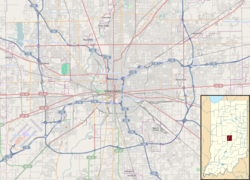
Back Hinkle Fieldhouse AST Hinkle Fieldhouse German Hinkle Fieldhouse Spanish Hinkle Fieldhouse Italian 힝클 필드 하우스 Korean
This article needs additional citations for verification. (June 2012) |
Indiana's Basketball Cathedral | |
 | |
| Former names | Butler Fieldhouse (1928–1966) |
|---|---|
| Location | 510 West 49th Street Indianapolis, Indiana, United States |
| Owner | Butler University |
| Operator | Butler University |
| Capacity | 9,100 (2014–present) 10,000 (2009–2014) 11,043 (1989–2009) 15,000 (1928–1989) |
Butler Fieldhouse | |
 National Historic Landmark plaque | |
| Coordinates | 39°50′37″N 86°10′2″W / 39.84361°N 86.16722°W |
| Built | 1927 |
| Architect | Fermor Spencer Cannon |
| NRHP reference No. | 83003573 |
| Significant dates | |
| Added to NRHP | December 22, 1983[1] |
| Designated NHL | February 27, 1987[2] |
| Surface | Hardwood |
| Construction | |
| Built | 1927 |
| Opened | March 7, 1928 |
| Renovated | 1989, 2011–2014 |
| Construction cost | $750,000 ($13.3 million in 2023 dollars[3]) |
| Architect | Fermor Spencer Cannon |
| Tenants | |
| Butler Bulldogs (Big East) (1928–present) Indianapolis Jets (BAA) (1948–1949) Indianapolis Olympians (NBA) (1949–1953) 1987 Pan American Games | |
Hinkle Fieldhouse (named Butler Fieldhouse from 1928 until 1966) is a basketball arena on the campus of Butler University in Indianapolis, Indiana. Completed in early 1928, it was the largest basketball arena in the United States until 1950. The facility was renamed Hinkle Fieldhouse in 1966 in honor of Butler's longtime coach and athletic director, Paul D. "Tony" Hinkle. It is the sixth-oldest college basketball arena still in use. Added to the National Register of Historic Places in 1983 and designated a U.S. National Historic Landmark in 1987, Hinkle Fieldhouse is sometimes referred to as "Indiana's Basketball Cathedral."
Hinkle Fieldhouse has served as the home court for the Butler Bulldogs men's basketball team since 1928 (with the exception of 1943 to 1945, when it was converted to a military barracks during World War II) and as the site of the annual Indiana High School Boys Basketball Tournament's championship games from 1928 to 1971. In addition to amateur and professional basketball games, it has hosted visits from U.S. presidents, indoor track events and bicycle races, professional tennis matches, circuses, and other civic and religious gatherings.[4]
The Butler Bulldogs men's basketball team won the Horizon League conference title at Hinkle in 2010. Several memorable high school basketball championship games were played at the Butler arena, including the 1954 title game, when tiny Milan High School's basketball team defeated a larger Muncie Central High School team. Milan's team served as the inspiration for the movie Hoosiers (1986), and the final scenes of the film's championship game were filmed at Hinkle Fieldhouse.[4][5]
- ^ "National Register Information System". National Register of Historic Places. National Park Service. March 15, 2006.
- ^ "Butler Fieldhouse". National Historic Landmark summary listing. National Park Service. Archived from the original on January 14, 2009. Retrieved October 18, 2008.
- ^ 1634–1699: McCusker, J. J. (1997). How Much Is That in Real Money? A Historical Price Index for Use as a Deflator of Money Values in the Economy of the United States: Addenda et Corrigenda (PDF). American Antiquarian Society. 1700–1799: McCusker, J. J. (1992). How Much Is That in Real Money? A Historical Price Index for Use as a Deflator of Money Values in the Economy of the United States (PDF). American Antiquarian Society. 1800–present: Federal Reserve Bank of Minneapolis. "Consumer Price Index (estimate) 1800–". Retrieved February 29, 2024.
- ^ a b Dalton, William D. (2021) [1994]. "Hinkle Fieldhouse". Digital Encyclopedia of Indianapolis. Indianapolis Public Library. Retrieved March 24, 2024.
- ^ Branch, John (March 16, 2010). "It's the Bricks That Make Butler Basketball Special". The New York Times. Retrieved March 24, 2024.




